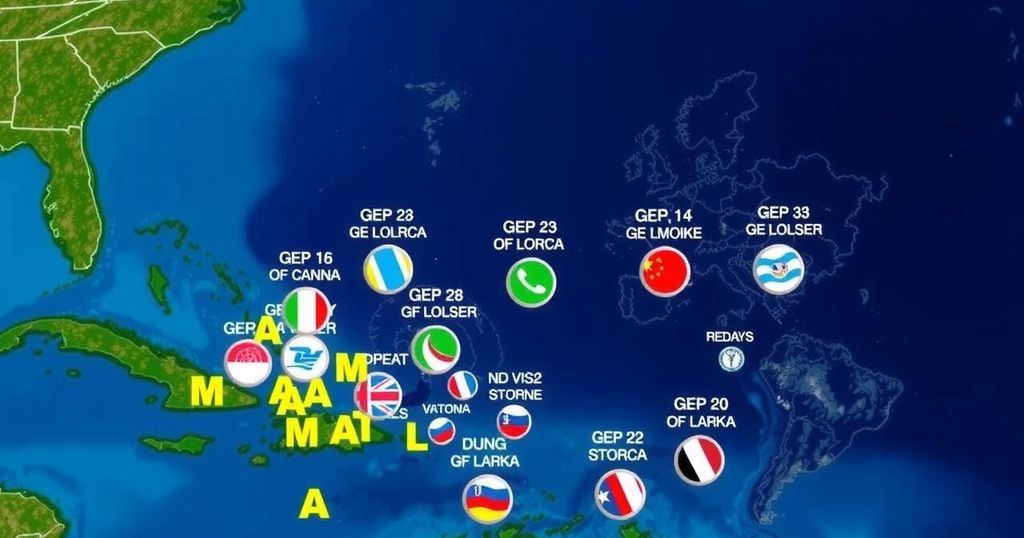Weather
World news
AFRICA, ARKANSAS DEMOCRAT GAZETTE, ASHEVILLE, ATLANTIC, BE, BERMUDA, BRIAN MCNOLDY, CARRIACOU, CUBA, DOMINICAN REPUBLIC, EUROPE/ASIA, EVACUATIONS, FLORIDA, GEORGIA, GRENADA, GULF COAST, GULF OF MEXICO, HELENE, HURRICANE, HURRICANE SEASON, JAMAICA, KATE, NATIONAL HURRICANE CENTER, NATURAL DISASTER, NATURAL DISASTERS, NORTH AMERICA, NORTH CAROLINA, ORLANDO, RAFAEL, SOUTH AFRICA, SOUTH CAROLINA, TAMPA, TENNESSEE, U. S, U. S. GULF COAST, UNITED STATES, UNIVERSITY OF MIAMI, VIRGINIA
Li Chen
0 Comments
2024 Atlantic Hurricane Season Concludes with Record-Breaking Storms
The 2024 Atlantic hurricane season concluded with 11 hurricanes, exceeding the average. Major storms included Hurricane Helene, the deadliest since Katrina, and Hurricane Milton, one of the strongest ever. Unusually warm ocean temperatures are linked to these extreme weather patterns, raising concerns about climate change’s influence on hurricane activity.
The conclusion of the 2024 Atlantic hurricane season marks a noteworthy period characterized by an unprecedented eleven hurricanes, surpassing the typical average of seven. Meteorologists have termed this season as unusually active, attributing it partly to warmer ocean temperatures. Eight hurricanes struck various regions including the U.S., Bermuda, and the Caribbean, resulting in significant devastation far from shorelines.
One of the most remarkable events was Hurricane Beryl, which emerged as the first recorded Category 4 hurricane of June, impacting Grenada severely. This event is particularly significant as hurricanes of such intensity are rare early in the season. Beryl intensified into the earliest Category 5 hurricane in the Atlantic by July 1, defying the expected timeline for major hurricanes, which normally does not begin until September 1.
In September, Hurricane Helene became the deadliest storm to strike the U.S. mainland since Hurricane Katrina, leading to over 200 fatalities and approximately $48.8 billion in damages, affecting multiple states and infrastructure across the southeastern United States. Later, Hurricane Milton escalated rapidly, reaching wind speeds of 180 mph, ranking it among the Gulf of Mexico’s most powerful hurricanes ever.
The period also accounted for extraordinary rainfall, which tripled the expected levels in regions impacted by Helene and Milton, marking record-breaking precipitation for certain areas. By November, Hurricane Rafael tied for the strongest hurricane recorded in the Gulf for that month, exacerbating recovery efforts in Cuba after Hurricane Oscar’s damage.
The article discusses the overall impact and severity of the 2024 Atlantic hurricane season, which was unusually active compared to historical averages. It highlights the significant loss of life and property due to several powerful hurricanes that formed earlier and later than typical, emphasizing the influence of climate change on these weather patterns. Notably, the warming effects of greenhouse gases have been cited as a factor contributing to increasingly extreme hurricane activity, underscoring a concerning trend in meteorological anomalies.
In summary, the 2024 Atlantic hurricane season has concluded with record-breaking storms that have caused widespread destruction and loss of life across multiple regions. The season’s intensity, characterized by an early Category 4 hurricane and a late-season Category 5, poses critical questions regarding the increasing impact of climate change on hurricane patterns. The ramifications of such severe storms continue to resonate, necessitating ongoing research and preparedness efforts.
Original Source: www.arkansasonline.com




Post Comment